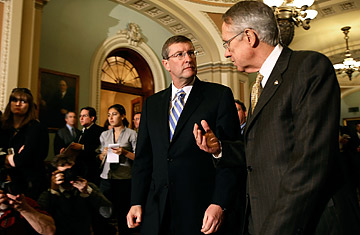
Senate Budget Committee chairman Kent Conrad, left, speaks with Senate majority leader Harry Reid after a closed-door meeting of the Senate Democratic caucus on March 25, 2009
The Democrats now have 60 votes in the Senate and a parliamentary tool that gives them the power to pass health-care reform with a simple majority of only 51. That means Republicans are, theoretically at least, powerless to stop President Obama's top domestic priority with a filibuster. So why are Democrats even bothering to keep negotiating with the minority party? Why don't they just pass health-care reform on Democratic votes alone?
That's the question that many of their allies are asking more and more, as the drive for health-care reform enters a make-or-break month with new signs of problems ahead. The party's liberal base is increasingly insistent that the bill include a strong, government-run public option, like a program similar to Medicare that would serve as an alternative to private insurers. Republicans are calling it a deal killer, which means any bill with a strong government-financed option would necessarily have to go forward without any significant GOP support. But diluting the bill too much — say, by making the public plan a fallback, to be created only if private insurers fail to bring down health-care costs, as some have suggested — risks allowing liberal Democratic support to slip away. Meanwhile, Democratic Senators are balking at Finance Committee chairman Max Baucus' proposal to pay for much of the health overhaul by imposing taxes for the first time ever on some of the health benefits that workers get from their employers. But absent those new taxes, Democrats may have to settle for a smaller, less costly bill.
The outlook didn't get any less murky after Senate majority leader Harry Reid met on July 8 with key Republicans. Reid spokesman Jim Manley said his boss — who the day before conveyed to Baucus he would have trouble getting his fellow Democrats to vote for taxing health benefits — told the Republicans that the time for posturing was over. It was now time, he stressed, to make clear whether they intended to be part of the process of writing a bill or simply oppose it. "The message was, 'Are you in or are you out?' " Manley said. But where Reid may have thought he was drawing a line in the sand, GOP Senators took away the opposite message — saying they saw signs that the majority leader might be flexible on his deadline of passing a bill by the time Congress leaves town for its August recess.
Democrats will have to decide in the coming weeks whether they are willing to go it alone on health reform or whether they will continue to negotiate with Republicans for a bill that would likely be less expensive and contain far less of a role for government in the health-care system. The chief tool Democrats have for ramming through a bill on their own is something known, incongruously enough, as "reconciliation." It is a parliamentary procedure that protects budget-related measures from a filibuster. (There's yet another possibility: Reid might put the pressure on his own caucus by simply calling for a vote and demanding that all 60 support blocking a filibuster, even if they don't ultimately vote for the bill. This strategy, however, would assume that Ted Kennedy and Robert Byrd — both of whom have been absent in recent months due to serious health problems — could make it to the chamber for a vote.)
Senate Budget Committee chairman Kent Conrad of North Dakota noted in an interview that passing health-care reform under the reconciliation rule poses as many problems as it solves for the Democrats and for health reform. Any bill that passes under the reconciliation process must be deemed by the Congressional Budget Office to pay for itself in the next six years. (By comparison, a bill that passes under regular procedures has an 11-year window.) As a result of that tighter fiscal constraint, Conrad said, any bill that passes under reconciliation would likely provide "dramatically less health reform." And the parliamentary hurdles are high. Opponents would have the power under Senate rules to strike every provision of the bill that cannot be shown to reduce the federal deficit. The result, Conrad said, could look like "Swiss cheese."
But before any bill can get to the Senate floor, lawmakers have to figure out a way to pay for it, and their current proposal is running up against stiff resistance from Democrats. Polls show that voters are resistant to any means of paying for health reform — and especially to the idea of taxing benefits they are accustomed to getting tax-free. In June, for instance, a Washington Post/ABC poll asked respondents whether they would support taxing employer-provided benefits, even if it were limited to relatively generous plans worth $17,000 a year or more; 7 out of 10 said no. The Finance Committee had been hoping that taxing plans that are more generous than average could raise more than $300 billion over the next 10 years. Now it is considering a higher threshold for taxation — say, for plans that cost in excess of $25,000 a year. That would mean far fewer Americans would have to pay that tax, but it would raise less than one-third the revenue. Another idea, being floated by former Senate majority leader Tom Daschle, would be to limit instead the deduction that companies could claim for providing those benefits. Because that additional tax would fall on businesses rather than on individuals, it might be more palatable politically — though it would also raise far less revenue and would likely be passed onto employees indirectly.
The next few weeks will bring some hard decisions for everyone involved in the health-reform debate. But the bottom line will come down to one crucial question: Is it riskier to push for health reform — or to be seen as having stopped it?
